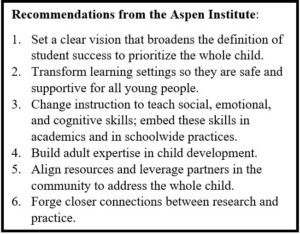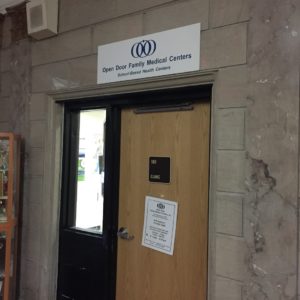Support the “Whole Child”: The Aspen Institute Promotes What Odds-Beating Educators Know and Do
By Catherine Kramer, Research Assistant, NYKids
“There is a remarkable confluence of experience and science on one point: Children learn best when we treat them as human beings, with social and emotional as well as academic needs,” according to the Aspen Institute National Commission on Social, Emotional and Academic Development in their new report, From a Nation at Risk to a Nation at Hope.
Young people, according to the findings from the report, need support to develop traits like confidence, perseverance, consciousness, and independence. This results in healthy development as well as supports learning. These traits are associated with success in post-secondary education and in the workplace.

Perspectives of “Whole Child” in Odds-Beating Secondary Schools
The findings and recommendations from the Aspen Institute are consistent with the findings from the latest study from NYKids, College and Career Readiness: Promising Practices from Odds-Beating Secondary Schools.
Educators in the seven odds-beating secondary schools shared common practices related to nurturing well-rounded and healthy young people. Educators described supporting youth with developing “soft skills,” engaging in extracurricular activities, and honing the skills necessary for civic engagement.

A “Whole Child” Focus in Practice
Crown Point: In rural Crown Point this whole child focus manifests as a formal mentoring program where every adult in the building (district and school administrators, administrative assistants, teachers and teaching assistants) is assigned a group of 5-8 students who they meet with monthly to discuss topics like developing positive character traits. Matches are made based on student preferences.
Port Chester: While at Port Chester, serving a relatively large number of English language learners and a culturally diverse student body, leaders and educators are mindful of the physical and mental health needs of young people in their community. To ensure healthy development, a school-based clinic offers health care services on-site.
Malverne: At Malverne, also serving a diverse student body, outside-of-school resources and experiences are used to keep students engaged in school as well as to provide additional support to students who may be struggling academically. For example, Malverne hosts a math and science summer camp designed to reinforce skills while allowing for fun. They also take students into the community to build important life skills like how to do banking.
Sherburne-Earville: Sherburne Earlville educators, in one of the most sprawling rural districts in the state, focus on fostering independence by providing kids with a variety of choices offered to pique and build on their interests. Maple syrup farming as just one activity in their reinvigorated Agricultural Sciences offerings provides an example.
Upcoming Event
Stay tuned: NYKids team members Catherine Kramer, Kristen Wilcox and Hal Lawson will present more of these findings at the American Education Research Conference on April 5th.
